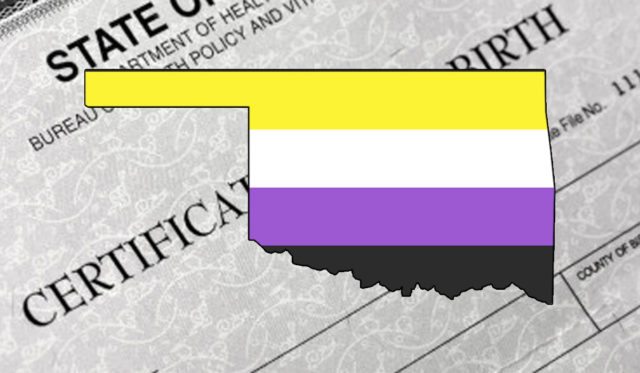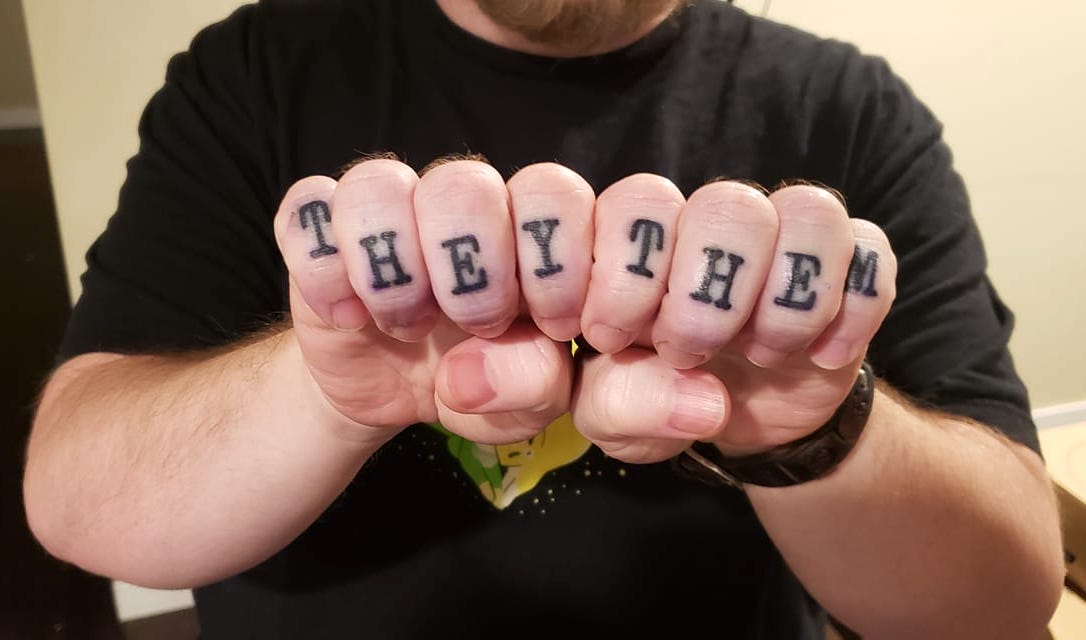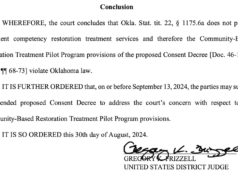

In settling a federal lawsuit by Oregon resident Kit Lorelied against the Oklahoma State Department of Health, Oklahoma has formalized a process for designating someone’s sex as nonbinary on birth certificates.
Oklahoma now joins 14 other states and the District of Columbia in offering an amendment avenue to select nonbinary designation on reissued birth certificates. On Oct. 7, Lorelied became the first person in Oklahoma history to receive an amended birth certificate with a nonbinary sex designation, according to their attorney.
“Having a birth certificate that matches my identity means that the government respects my right to exist without having to hide who I am,” Lorelied said in an email. “It means that I can be treated with the dignity that any citizen deserves.”
Born and raised in Oklahoma, Lorelied uses they, them and their as pronouns and identifies as nonbinary.
Jackie Shawnee, chief of staff for Oklahoma Commissioner of Health Dr. Lance Frye, explained the new process for amending birth certificates in a statement to NonDoc.
“Requirements for legally changing the sex designation on an Oklahoma birth certificate have changed,” Shawnee said. “In order to legally change the sex designation on an original Oklahoma birth certificate, you must obtain a court order from an Oklahoma court. A certified copy of this court order must be presented to (the) Oklahoma (Office of) Vital Records before an amended birth certificate can be issued.”
The Office of Vital Records is a division within the Oklahoma State Department of Health. As commissioner of health, Frye leads the OSDH and was named as a defendant in the lawsuit, which was filed in August 2020 in U.S. District Court for the Western District of Oklahoma.
The lawsuit settlement and Oklahoma’s new process for nonbinary sex designation was hailed as “a huge step forward” by Christopher Brecht, a Tulsa family attorney who represented Lorelied.
“For Oklahoma to do that without being pulled across the finish line, I’m proud of us, and I’m happy that people are able to get those affirming documents,” Brecht said. “When the basic documents that identify who you are to the world don’t accurately identify you, I think there’s nothing really more degrading. I think that we can do this for folks now is a huge step forward.”
Brecht serves on the board of directors for the LGBTQ advocacy group Oklahomans for Equality, which Lorelied contacted earlier this year.
X marks the spot for nonbinary birth certificate

The settlement agreement means Oklahomans who do not identify as male or female can now request an amended birth certificate from the Office of Vital Records with an “X” designation instead of male (M) or female (F).
Gender nonbinary — or genderqueer — is an umbrella term used for a variety of gender identities outside male and female designations. In 2021, the Williams Institute at UCLA estimated that around 1.2 million people in the U.S. identify as nonbinary.
How to amend
your birth certificateAccording to the Office of Vital Records, it costs $40 to amend a birth certificate in Oklahoma. An additional $13.95 processing fee applies for online orders. Additional costs may be incurred in obtaining a court order from a district judge.
When requesting an amended birth certificate, applicants must submit a completed birth certificate request form, a copy of a photo ID, a $40 check or money order, a certified copy of the court order and a brief note explaining what action is being requested.
“Now people who identify as nonbinary are also — like their trans brothers and sisters — able to get gender-affirming vital records that at least do not designate them within the binary of either male or female,” Brecht said.
Birth certificates are essential documents needed to prove one’s identity and are used to obtain other important legal documents — social security cards, passports and driver licenses — and to enroll in school, gain employment or apply for benefits.
“Initially, [the state] opposed [our request] and asserted the position that there is no such thing as a nonbinary sex,” Brecht said. “(They argued) there is a difference between gender and sex, essentially.”
Brecht and Lorelied ultimately avoided litigating that assertion by reaching the settlement with the state.
Transgender individuals already had the ability to amend the sex designation on their Oklahoma birth certificates and are also able to request gender-affirming ID through the Oklahoma Department of Public Safety after obtaining a court order and potentially a notarized letter from a physician who performed the petitioner’s gender-affirming surgery.
With the nonbinary designation on birth certificates, Brecht said he is not sure but believes nonbinary individuals can change their Oklahoma driver’s license.
Follow @NonDocMedia on:
‘Their body, their lives and their world’
Lorelied, 46, wanted an amended birth certificate to match their gender identity in anticipation of the nonbinary designation becoming available for U.S. passports. (U.S. Secretary of State Anthony Blinken announced in June that such a change would be coming.)
Lorelied was born in Stillwater in 1974 but spent the majority of their childhood in Seminole. After receiving a graduate degree in library science from Kent State University in 2006, they moved to Oregon.
“I am glad that I can use my limited privilege to help others like myself to feel more (at) home in their body, their lives and their world,” Lorelied said. “The idea that more people can feel this way because of one small act I did brings me so much joy.”
State senator seeks statute on sex designation
In response to the new OSDH policy, Sen. Micheal Bergstrom (R-Adair) distributed a press release late Wednesday afternoon saying he has filed SB 1100 for the 2022 legislative session to prohibit any option other than male or female from being marked under sex designation on birth certificates.
“We’re at an odd time in history where people are seemingly forgetting science and biology and casting common sense out the window,” Bergstrom said in his press release. “When babies are born, they are either born male or female based on their chromosomes and genitals. Allowing anything else to be listed on a birth certificate is ludicrous, and it’s time we clarify this in our statutes.”
Bergstrom said representatives of the Oklahoma State Department of Health had assured him “a couple months ago that they had no intention of adding another sex option to birth certificates.”
Nicole McAfee, executive director of Freedom Oklahoma, said her organization is mindful of the harm that can be done to LGBTQ people when simply the proposal of legislation targeting them becomes a news story.
“That being said, genders beyond a binary have always existed. That has been the case in Oklahoma as much as it has been anywhere else,” McAfee said. “We know that having legal documents that correspond with people’s gender identity and expression are an active version of harm reduction, and we always celebrate when it is possible for people to obtain those.”
McAfee noted that Oct. 26 will mark the recognition of Intersex Awareness Day to promote human rights events for intersex people. Nonbinary and intersex are not synonymous terms, but both groups can be excluded when limited to traditional male and female designations. Intersex is an umbrella term referring to people born with anatomy that does not strictly fit the categories of male or female.
Instead of espousing “sensationalized talking points” that can harm LGBTQ Oklahomans, McAfee encouraged state lawmakers to listen to them and understand their needs.
“Transgender and nonbinary people — people who live outside of and beyond the gender binary — experience suicidality at exceptionally high rates,” McAfee said. “That is especially true for young transgender people, so I would ask that [lawmakers] consider not how they fight processes that help folks but instead listen to transgender and gender diverse people in Oklahoma to better meet their needs.”
Rep. Mauree Turner (D-OKC) is the first nonbinary person elected to the Oklahoma Legislature, and they noted that Oct. 21 is Spirit Day, for which people wear purple to show support for LGBTQ youth who experience bullying.
Turner said Bergstrom’s proposed bill “could reinforce harm on children (and) on people who are nonbinary.”
“The very tip of harm reduction is utilizing and affirming people’s pronouns,” Turner said. “We’ve got the power to make lives wonderful, and for some reason we’ve got people in our Legislature who want to legislate from a place of bigotry as opposed to a place of sound policy that benefits people.”
Turner said lawmakers should devote more attention to assisting with unemployment issues, creating affordable housing and making adequate health care accessible. They questioned the relevance of discussing Bergstrom’s newly filed bill at all.
“We cannot continue to give hate a platform,” Turner said.
Stitt pledges action against nonbinary birth certificate process
The morning after this article’s publication, Oklahoma Gov. Kevin Stitt released a statement saying “there is no such thing as nonbinary sex” and that he would take action related to the new OSDH process.
“I believe that people are created by God to be male or female. Period. There is no such thing as nonbinary sex and I wholeheartedly condemn the purported OSDH court settlement that was entered into by rogue activists who acted without receiving proper approval or oversight,” Stitt said. “I will be taking whatever action necessary to protect Oklahoma values and our way of life.”
House Speaker Charles McCall (R-Atoka) and Senate President Pro Tempore Greg Treat (R-OKC) released their own statements, saying Republican legislators expect Stitt to issue an executive order reversing the Health Department decision.
“Unelected employees in the executive branch of government have no authority to make decisions of this magnitude,” McCall said. “The vast majority of elected House members expect the governor, as the elected leader of the executive branch, to immediately take executive action to follow through on his pledge to undo this. This executive branch agency acted outside its scope of authority, and now the governor, as the leader of that branch of government, must correct it immediately through executive order.”
Treat echoed McCall’s remarks.
“The authority to institute policy changes of this magnitude rightly belongs within the legislative branch, the branch of government closest to the people,” Treat said. “Executive branch agencies should not attempt to legislate or make substantive policy changes like this through rulemaking or court settlement. This is an egregious example of executive overreach that should be corrected as soon as possible.”
House Minority Leader Emily Virgin (D-Norman) issued a statement late Thursday criticizing Stitt’s remarks.
“This morning, the governor used his pulpit to attack Oklahomans. Period. A national study estimated that 52 percent of transgender and non-binary young people in the United States seriously contemplated suicide last year,” Virgin said. “The governor’s suggestion that nonbinary people don’t qualify as Oklahomans is abhorrent and completely unbecoming of a governor. Moreover, it is dangerous. We are elected to help people not make their lives harder.”
(Editor’s note: Tres Savage contributed to this report. It was updated at 10:50 a.m. Thursday, Oct. 21, to include Stitt’s comment. It was updated again at 12:23 p.m. to include statements from McCall and Treat. It was updated a final time at 4:25 p.m. to include comment from Virgin.)




















